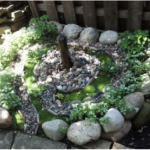In case you missed it, Carole Hyder blogged about mindfulness and Feng Shui this past spring. Here’s an excerpt and a link for your convenience!
According to the dictionary, the word mindfulmeans “watchful, attentive, conscious, thoughtful.” Although mindfulness isn’t specifically a Feng Shui principle, it’s an implied attribute because of the inherent need for being clear and focused when applying Feng Shui adjustments. Although changes in the environment can be made without much thought, their effectiveness will be marginal. The point of making those changes relies on a person’s thoughtful and mindful consideration of how they’d like to see their life unfold.
We all fall into routines where we do things without thinking about them. Driving a familiar route can enable us to let go of our attention. Cleaning the house, washing dishes, making the bed can feel like mindless activities. If by “mindless” we mean they’re all things we can do without thinking, then, yes, they’re mindless. Grant you, sometimes it feels like a relief to be able to do something without having to add brain power behind it.
But what if we were to add our thoughtful mind to the experience? What if we were to engage with the routine and make it rich with meaning? How would we feel if something that’s same-old same-old became brand-new brand-new?
Whether you’re talking about a tangible object or a specific action, you can progress it from being mindless to being mindful with some simple considerations.
- Narrate the details. Although you may do something automatically and, in fact, feel that the action is so mundane that it doesn’t deserve your full attention, I suggest you try running a silent narrative describing your actions. It will bring your focus to each step as you fold those clothes or put the clean dishes away.
- Bring in aesthetics. By infusing elegance and grace into the action, it becomes more of a dance than a drudgery. Using this filter may automatically slow you down so you can relish the interplay of magnificence with the mundane.
- Breathe. This will by its very nature cause you to slow down to pay attention to your breath. In doing so, you bring your focus to the present moment where you can turn a mindless activity or object into a meaningful and mindful one.
So think about your day and where you might not be very thoughtful. Where do you go on automatic? What if it were no longer an option to be “automatic?” What if you had to take that shower or pack your kids’ lunches with full-on attention? How would that change your experience? On another note, what if you did something you don’t like to do but did it mindfully? Just what if vacuuming became an aesthetic activity, calibrated to your breath, as you detailed in your mind each of the sweeps of the vacuum?
For the rest of Carole’s blog post, visit her website here.




 This all started because our neighbors sit out on their front patio and have coffee on weekend mornings and sometimes wine in the evenings. Their dog would wander around their front yard. I would watch them and think how sweet—–they would wave and talk to people walking by. Over the top of their newspaper they’d acknowledge someone with a smile. I suddenly realized that I wanted a place to sit in front of our house.
This all started because our neighbors sit out on their front patio and have coffee on weekend mornings and sometimes wine in the evenings. Their dog would wander around their front yard. I would watch them and think how sweet—–they would wave and talk to people walking by. Over the top of their newspaper they’d acknowledge someone with a smile. I suddenly realized that I wanted a place to sit in front of our house.










Recent Comments